Thomas James Richards, Diaries, Transcript Vol. 3, 26 January to 8 November 1916 - Part 1
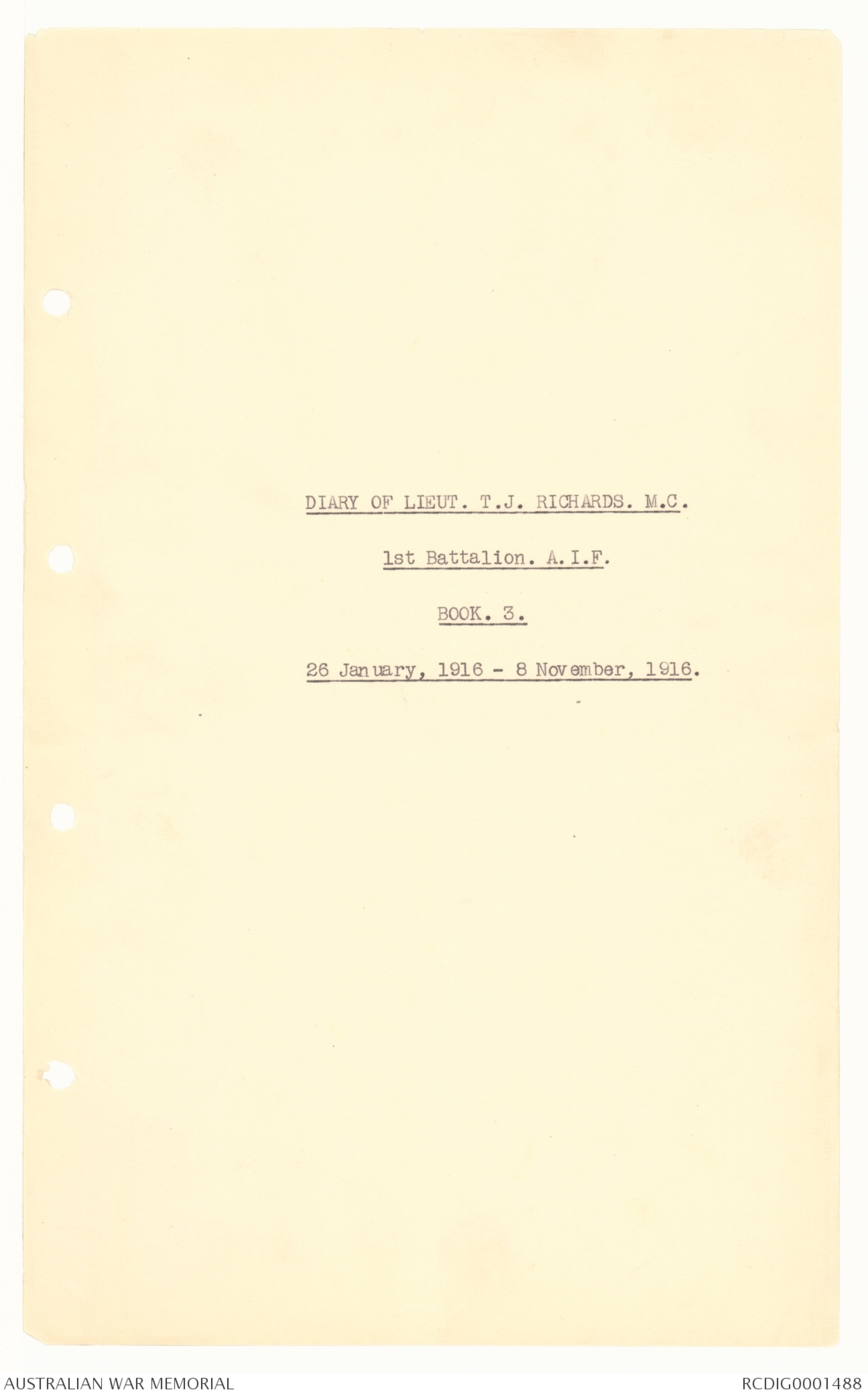
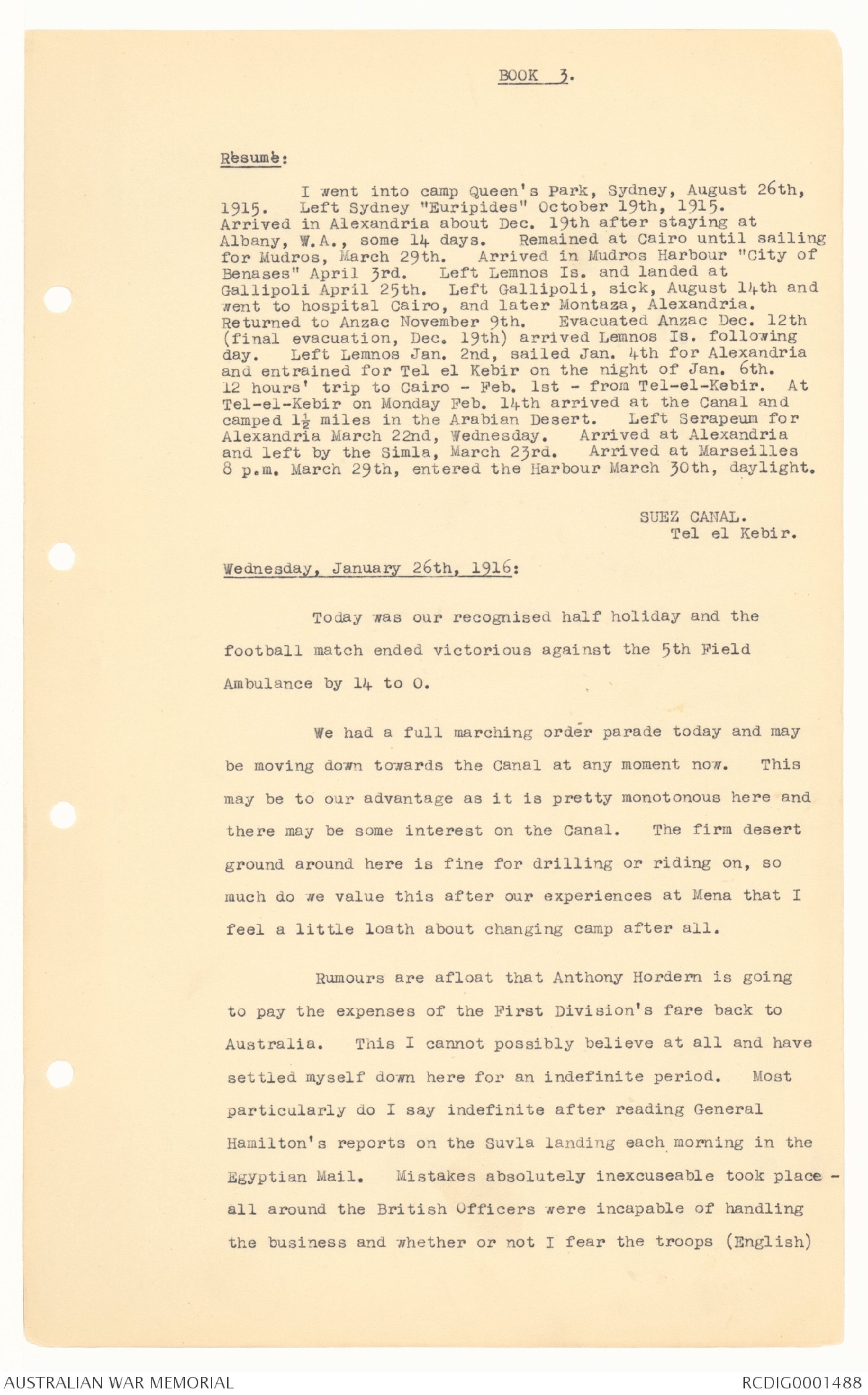
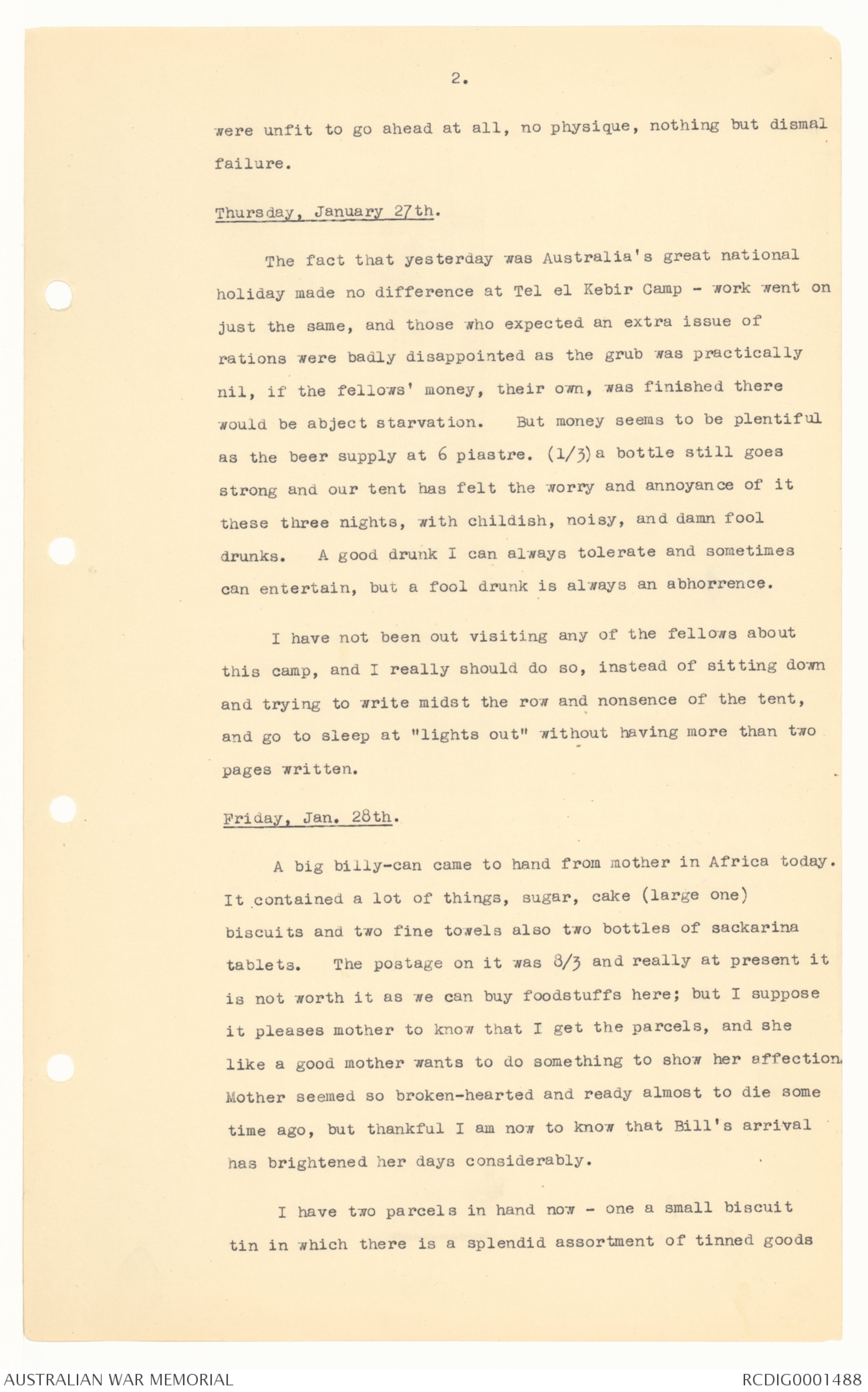
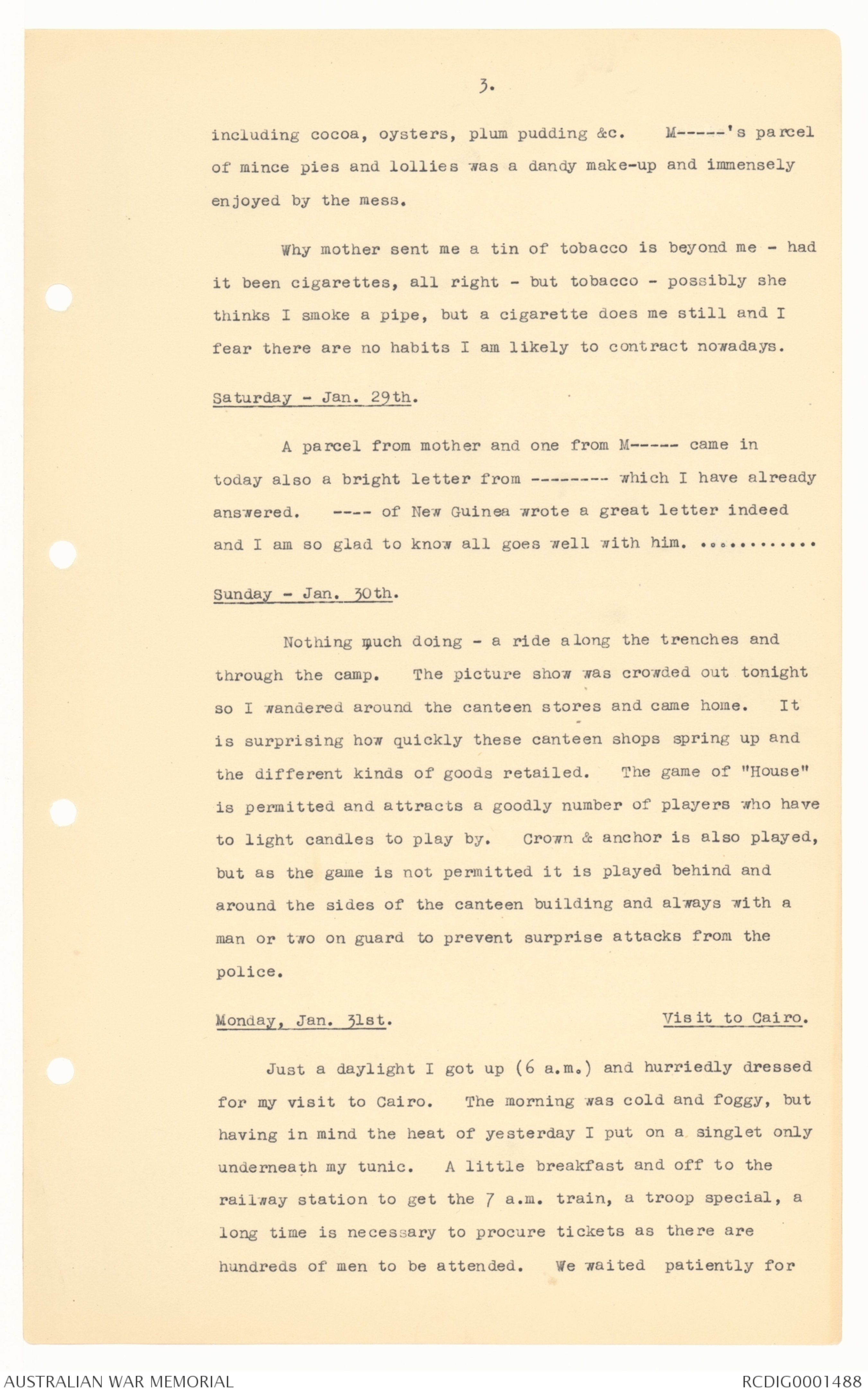
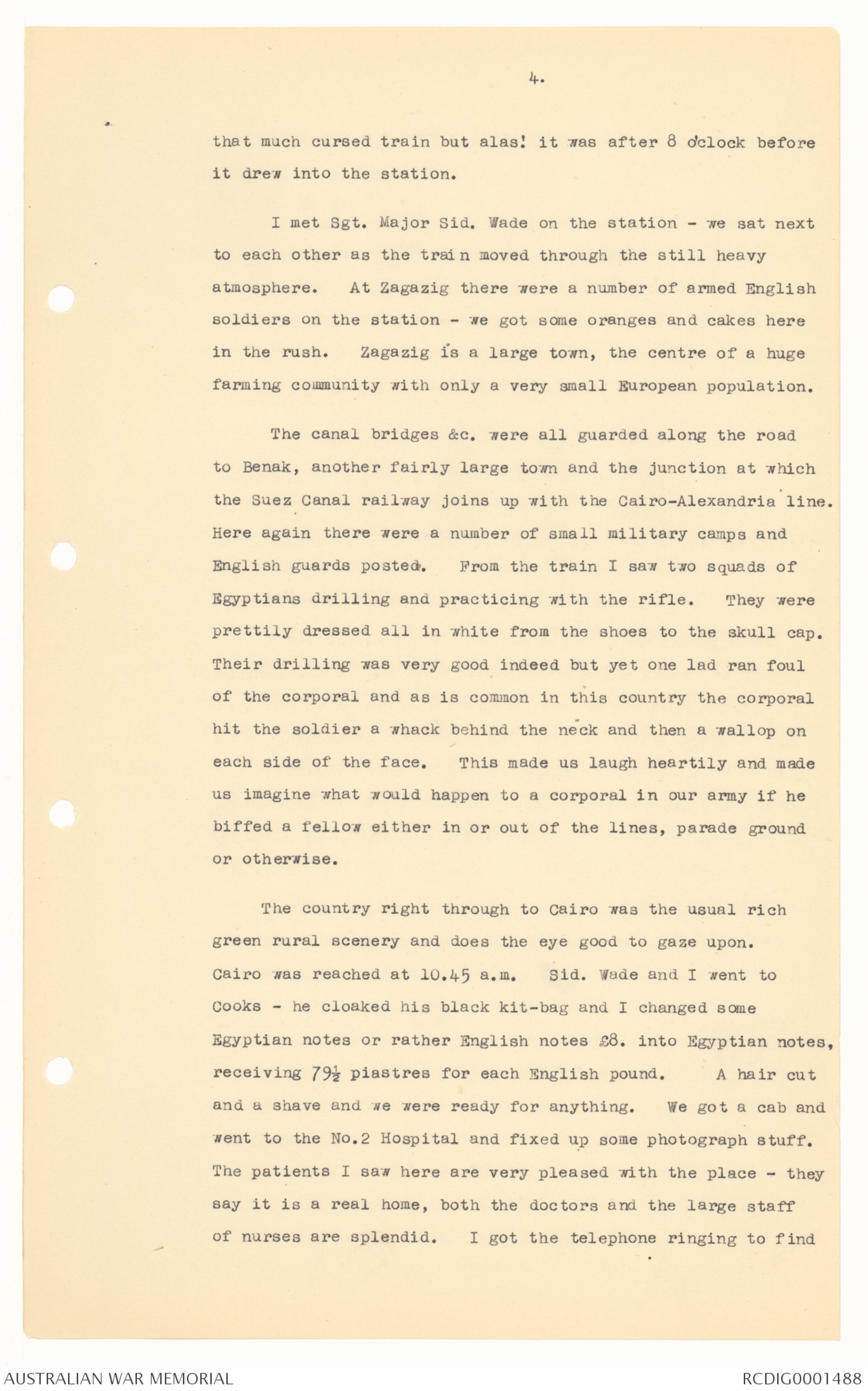
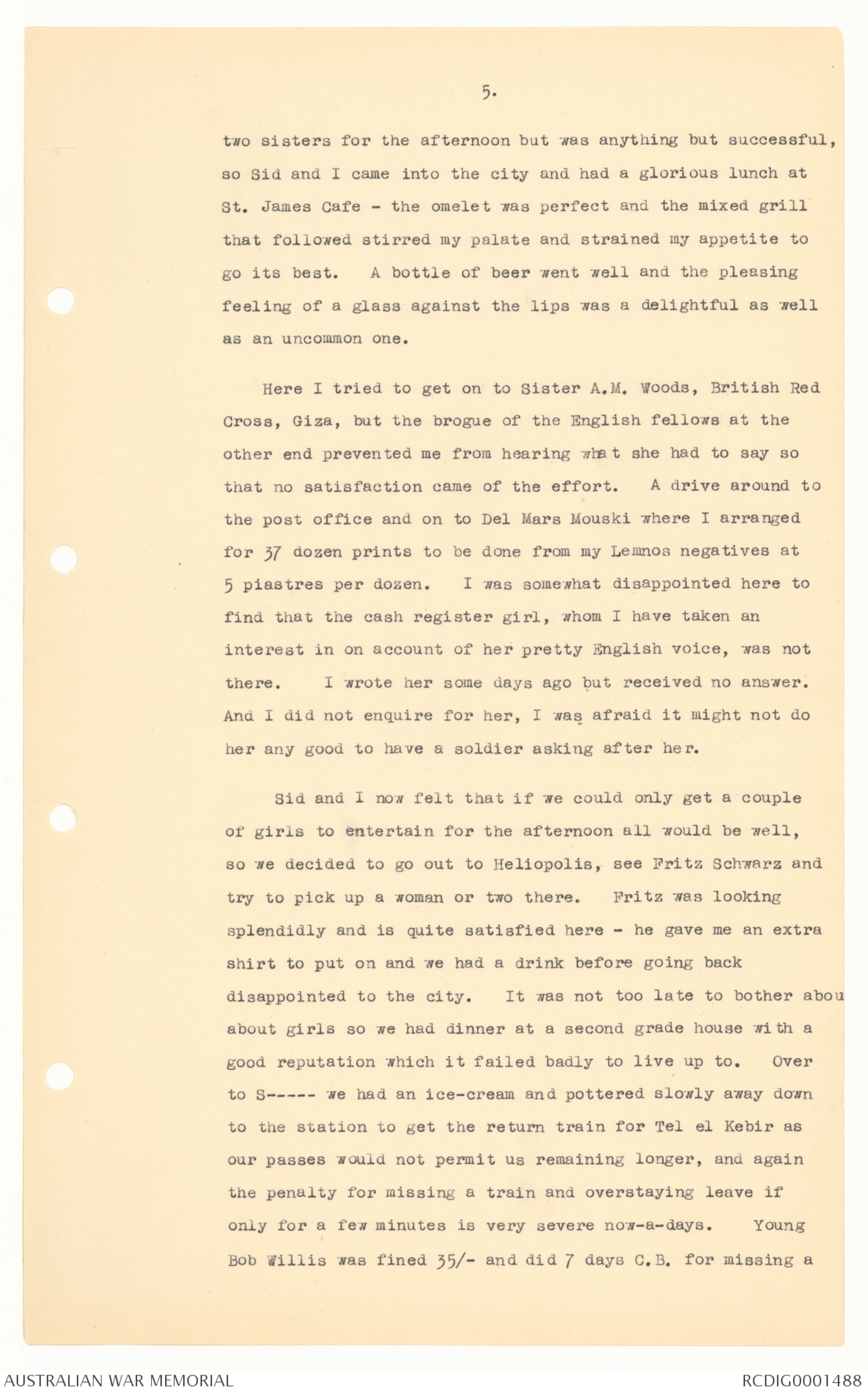
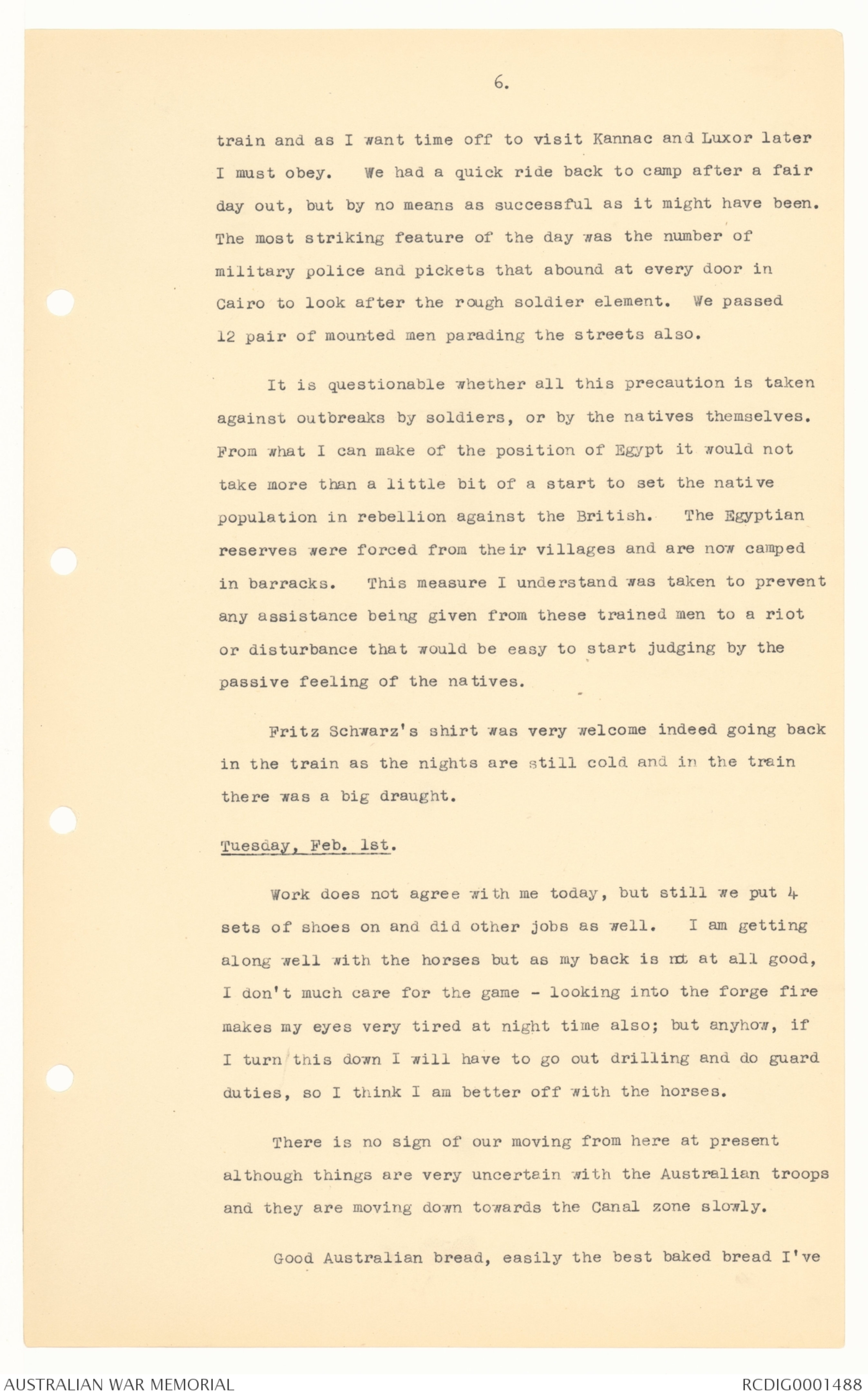
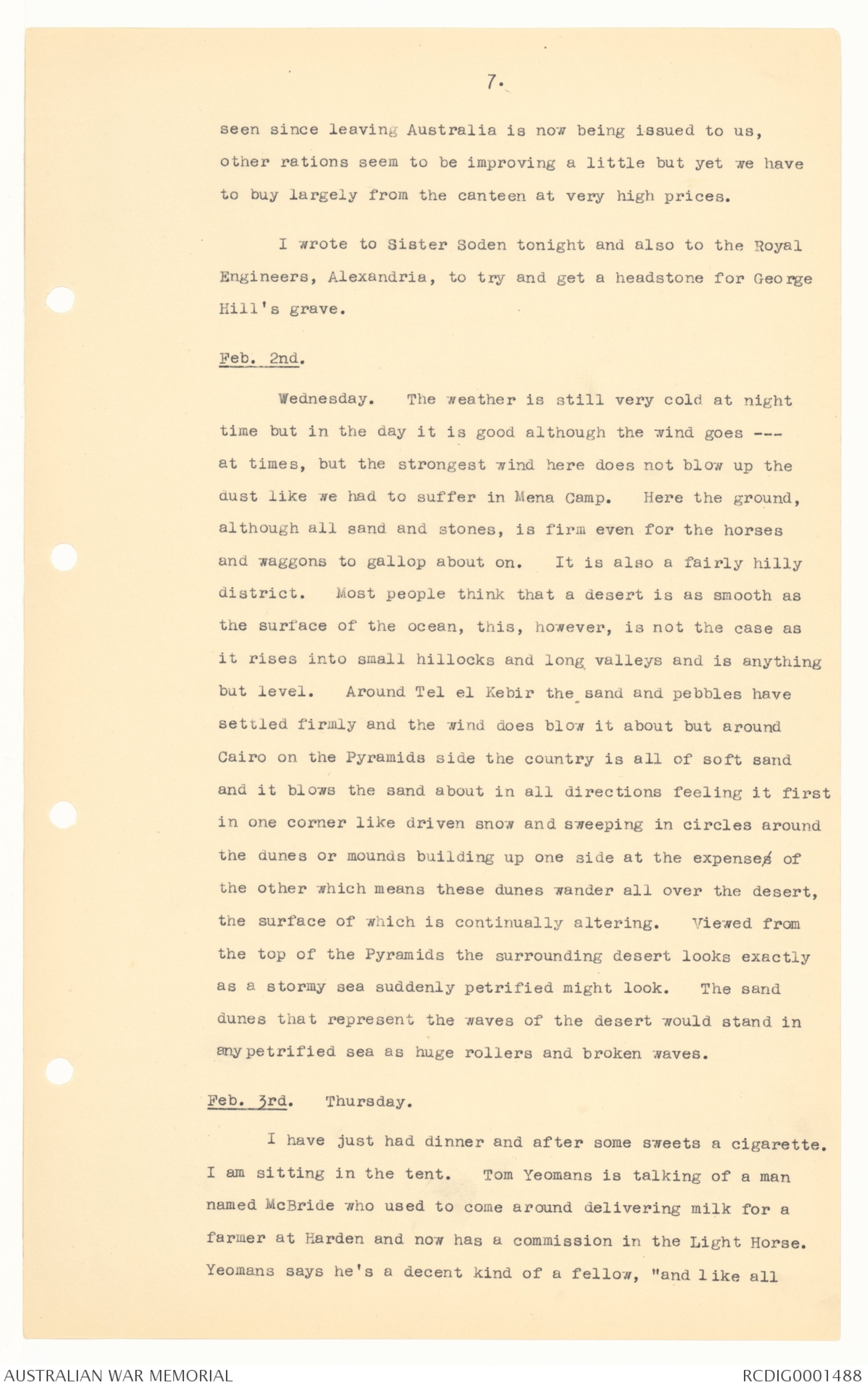
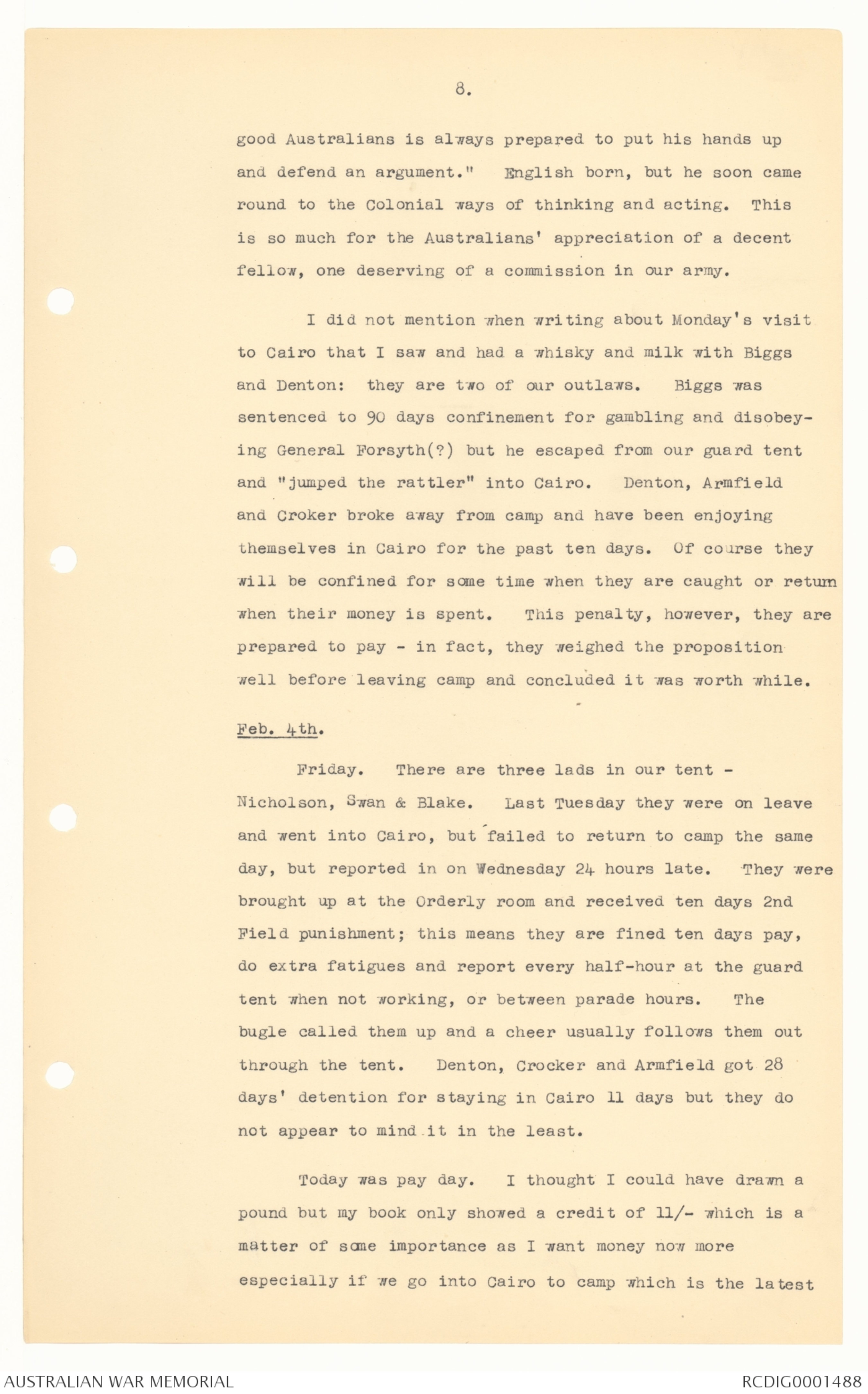
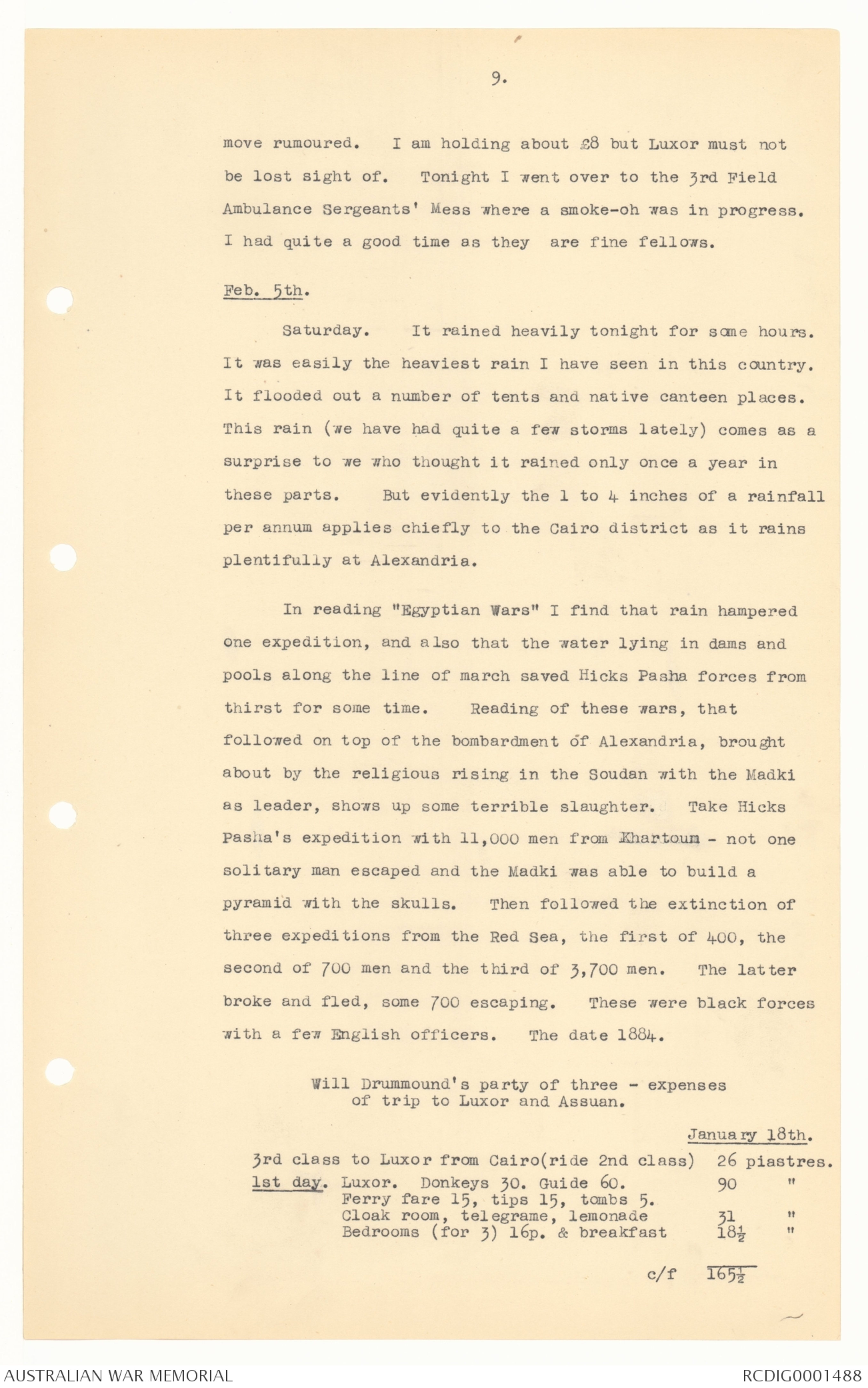
DIARY OF LIEUT. T.J. RICHARDS. M.C.
1st Battalion. A.I.F.
BOOK. 3.
26 January, 1916 - 8 November, 1916.
BOOK 3.
Résumé:
I went into camp Queen's Park, Sydney, August 26th,
1915. Left Sydney "Euripides" October 19th, 1915.
Arrived in Alexandria about Dec. 19th after staying at
Albany, W.A., some 14 days. Remained at Cairo until sailing
for Mudros, March 29th. Arrived in Mudros Harbour "City of
Benases" April 3rd. Left Lemnos Is. and landed at
Gallipoli April 25th. Left Gallipoli, sick, August 14th and
went to hospital Cairo, and later Montaza, Alexandria.
Returned to Anzac November 9th. Evacuated Anzac Dec. 12th
(final evacuation, Dec. 19th) arrived Lemnos Is. following
day. Left Lemnos Jan. 2nd, sailed Jan. 4th for Alexandria
and entrained for Tel el Kebir on the night of Jan. 6th.
12 hours' trip to Cairo - Feb. 1st - from Tel-el-Kebir. At
Tel-el-Kebir on Monday Feb. 14th arrived at the Canal and
camped 1½ miles in the Arabian Desert. Left Serapeun for
Alexandria March 22nd, Wednesday. Arrived at Alexandria
and left by the Simla, March 23rd. Arrived at Marseilles
8 p.m. March 29th, entered the Harbour March 30th, daylight.
SUEZ CANAL.
Tel el Kebir.
Wednesday, January 26th, 1916:
Today was our recognised half holiday and the
football match ended victorious against the 5th Field
Ambulance by 14 to 0.
We had a full marching order parade today and may
be moving down towards the Canal at any moment now. This
may be to our advantage as it is pretty monotonous here and
there may be some interest on the Canal. The firm desert
ground around here is fine for drilling or riding on, so
much do we value this after our experiences at Mena that I
feel a little loath about changing camp after all.
Rumours are afloat that Anthony Hordern is going
to pay the expenses of the First Division's fare back to
Australia. This I cannot possibly believe at all and have
settled myself down here for an indefinite period. Most
particularly do I say indefinite after reading General
Hamilton's reports on the Suvla landing each morning in the
Egyptian Mail. Mistakes absolutely inexcuseable took place -
all around the British Officers were incapable of handling
the business and whether or not I fear the troops (English)
2.
were unfit to go ahead at all, no physique, nothing but dismal
failure.
Thursday, January 27th.
The fact that yesterday was Australia's great national
holiday made no difference at Tel el Kebir Camp - work went on
just the same, and those who expected an extra issue of
rations were badly disappointed as the grub was practically
nil, if the fellows' money, their own, was finished there
would be abject starvation. But money seems to be plentiful
as the beer supply at 6 piastre. (1/3) a bottle still goes
strong and our tent has felt the worry and annoyance of it
these three nights, with childish, noisy, and damn fool
drunks. A good drunk I can always tolerate and sometimes
can entertain, but a fool drunk is always an abhorrence.
I have not been out visiting any of the fellows about
this camp, and I really should do so, instead of sitting down
and trying to write midst the row and nonsence of the tent,
and go to sleep at "lights out" without having more than two
pages written.
Friday, Jan. 28th.
A big billy-can came to hand from mother in Africa today.
It contained a lot of things, sugar, cake (large one)
biscuits and two fine towels also two bottles of sackarina
tablets. The postage on it was 8/3 and really at present it
is not worth it as we can buy foodstuffs here; but I suppose
it pleases mother to know that I get the parcels, and she
like a good mother wants to do something to show her affection.
Mother seemed so broken-hearted and ready almost to die some
time ago, but thankful I am now to know that Bill's arrival
has brightened her days considerably.
I have two parcels in hand now - one a small biscuit
tin in which there is a splendid assortment of tinned goods
3.
including cocoa, oysters, plum pudding &c. M-----'s parcel
of mince pies and lollies was a dandy make-up and immensely
enjoyed by the mess.
Why mother sent me a tin of tobacco is beyond me - had
it been cigarettes, all right - but tobacco - possibly she
thinks I smoke a pipe, but a cigarette does me still and I
fear there are no habits I am likely to contract nowadays.
Saturday - Jan. 29th.
A parcel from mother and one from M----- came in
today also a bright letter from -------- which I have already
answered. ---- of New Guinea wrote a great letter indeed
and I am so glad to know all goes well with him. . . . . . . . . . . . .
Sunday - Jan. 30th.
Nothing much doing - a ride along the trenches and
through the camp. The picture show was crowded out tonight
so I wandered around the canteen stores and came home. It
is surprising how quickly these canteen shops spring up and
the different kinds of goods retailed. The game of "House"
is permitted and attracts a goodly number of players who have
to light candles to play by. Crown & anchor is also played,
but as the game is not permitted it is played behind and
around the sides of the canteen building and always with a
man or two on guard to prevent surprise attacks from the
police.
Monday, Jan. 31st.
Visit to Cairo.
Just a daylight I got up (6 a.m.) and hurriedly dressed
for my visit to Cairo. The morning was cold and foggy, but
having in mind the heat of yesterday I put on a singlet only
underneath my tunic. A little breakfast and off to the
railway station to get the 7 a.m. train, a troop special, a
long time is necessary to procure tickets as there are
hundreds of men to be attended. We waited patiently for
4.
that much cursed train but alas! it was after 8 o'clock before
it drew into the station.
I met Sgt. Major Sid. Wade on the station - we sat next
to each other as the train moved through the still heavy
atmosphere. At Zagazig there were a number of armed English
soldiers on the station - we got some oranges and cakes here
in the rush. Zagazig is a large town, the centre of a huge
farming community with only a very small European population.
The canal bridges &c. were all guarded along the road
to Benak, another fairly large town and the junction at which
the Suez Canal railway joins up with the Cairo-Alexandria line.
Here again there were a number of small military camps and
English guards posted. From the train I saw two squads of
Egyptians drilling and practicing with the rifle. They were
prettily dressed all in white from the shoes to the skull cap.
Their drilling was very good indeed but yet one lad ran foul
of a corporal and as is common in this country the corporal
hit the soldier a whack behind the neck and then a wallop on
each side of the face. This made us laugh heartily and made
us imagine what would happen to a corporal in our army if he
biffed a fellow either in our out of the lines, parade ground
or otherwise.
The country right through to Cairo was the usual rich
green rural scenery and does the eye good to gaze upon.
Cairo was reached at 10.45 a.m. Sid. Wade and I went to
Cooks - he cloaked his black kit-bag and I changed some
Egyptian notes or rather English notes £8. into Egyptian notes,
receiving 79½ piastres for each English pound. A hair cut
and a shave and we were ready for anything. We got a cab and
went to the No.2 Hospital and fixed up some photograph stuff.
The patients I saw here are very pleased with the place - they
say it is a real home, both the doctors and the large staff
of nurses are splendid. I got the telephone ringing to find
5.
two sisters for the afternoon but was anything but successful,
so Sid and I came into the city and had a glorious lunch at
St. James Cafe - the omelet was perfect and the mixed grill
that followed stirred by palate and strained my appetite to
go its best. A bottle of beer went well and the pleasing
feeling of a glass against the lips was a delightful as well
as an uncommon one.
Here I tried to get on to Sister A.M. Woods, British Red
Cross, Giza, but the brogue of the English fellows at the
other end prevented me from hearing what she had to say so
that no satisfaction came of the effort. A drive around to
the post office and on the Del Mars Mouski where I arranged
for 37 dozen prints to be done from my Lemnos negatives at
5 piastres per dozen. I was somewhat disappointed here to
find that the cash register girl, whom I have taken an
interest in on account of her pretty English voice, was not
there. I wrote her some days ago but received no answer.
And I did not enquire for her, I was afraid it might not do
her any good to have a soldier asking after her.
Sid and I now felt that if we could only get a couple
of girls to entertain for the afternoon all would be well,
so we decided to go out to Heliopolis, see Fritz Schwarz and
try to pick up a woman or two there. Fritz was looking
splendidly and is quite satisfied here - he gave me an extra
shirt to put on and we had a drink before going back
disappointed to the city. It was not too late to bother abou
about girls so we had dinner at a second grade house with a
good reputation which it failed badly to live up to. Over
to S----- we had an ice-cream and pottered slowly away down
to the station to get the return train for Tel el Kebir as
our passes would not permit us remaining longer, and again
the penalty for missing a train and overstaying leave if
only for a few minutes is very severe now-a-days. Young
Bob Willis was fined 35/- and did 7 days C.B. for missing a
6.
train and as I want time off to visit Kannac and Luxor later
I must obey. We had a quick ride back to camp after a fair
day out, but by no means as successful as it might have been.
The most striking feature of the day was the number of
military police and pickets that abound at every door in
Cairo to look after the rough soldier element. We passed
12 pair of mounted men parading the streets also.
It is questionable whether all this precaution is taken
against outbreaks by soldiers, or by the natives themselves.
From what I can make of the position of Egypt it would not
take more than a little bit of a start to set the native
population in rebellion against the British. The Egyptian
reserves were forced from their villages and are now camped
in barracks. This measure I understand was taken to prevent
any assistance being given from these trained men to a riot
or disturbance that would be easy to start judging by the
passive feeling of the natives.
Fritz Schwarz's shirt was very welcome indeed going back
in the train as the nights are still cold and in the train
there was a big draught.
Tuesday, Feb. 1st.
Work does not agree with me today, but still we put 4
sets of shoes on and did other jobs as well. I am getting
along well with the horses but as my back is not at all good,
I don't much care for the game - looking into the forge fire
makes my eyes very tired at night time also; but anyhow, if
I turn this down I will have to go out drilling and do guard
duties, so I think I am better off with the horses.
There is no sign of our moving from here at present
although things are very uncertain with the Australian troops
and they are moving down towards the Canal zone slowly.
Good Australian bread, easily the best baked bread I've
7.
seen since leaving Australia is now being issued to us,
other rations seem to be improving a little but yet we have
to buy largely from the canteen at very high prices.
I wrote to Sister Soden tonight and also to the Royal
Engineers, Alexandria, to try and get a headstone for George
Hill's grave.
Feb. 2nd.
Wednesday. The weather is till very cold at night
time but in the day it is good although the wind goes ---
at times, but the strongest wind here does not blow up the
dust like we had to suffer in Mena camp. Here the ground,
although all sand and stones, is firm even for the horses
and waggons to gallop about on. It is also a fairly hilly
district. Most people think that a desert is as smooth as
the surface of the ocean, this, however, is not the case as
it rises into small hillocks and long valleys and is anything
but level. Around Tel el Kebir the sand and pebbles have
settled firmly and the wind does blow it about but around
Cairo on the Pyramids side the country is all of soft sand
and it blows the sand about in all directions feeling it first
in one corner like driven snow and sweeping in circles around
the dunes or mounds building up one side at the expenses of
the other which means these dunes wander all over the desert,
the surface of which is continually altering. Viewed from
the top of the Pyramids the surrounding desert looks exactly
as a stormy sea suddenly petrified might look. The sand
dunes that represent the waves of the desert would stand in
any petrified sea as huge rollers and broken waves.
Feb. 3rd. Thursday.
I have just had dinner and after some sweets a cigarette.
I am sitting in the tent. Tom Yeomans is talking of a man
named McBride who used to come around delivering milk for a
farmer at Harden and now has a commission in the Light Horse.
Yeomans says he's a decent kind of a fellow, "and like all
8.
good Australians is always prepared to put his hands up
and defend an argument." English born, but he soon came
round to the Colonial ways of thinking and acting. This
is so much for the Australians' appreciation of a decent
fellow, one deserving of a commission in our army.
I did not mention when writing about Monday's visit
to Cairo that I saw and had a whisky and milk with Biggs
and Denton: they are two of our outlaws. Biggs was
sentenced to 90 days confinement for gambling and disobeying
General Forsyth(?) but he escaped from our guard tent
and "jumped the rattler" into Cairo. Denton, Armfield
and Croker broke away from camp and have been enjoying
themselves in Cairo for the past ten days. Of course they
will be confined for some time when they are caught or return
when their money is spent. This penalty, however, they are
prepared to pay - in fact, they weighed the proposition
well before leaving camp and concluded it was worth while.
Feb. 4th.
Friday. There are three lads in our tent -
Nicholson, Swan & Blake. Last Tuesday they were on leave
and went into Cairo, but failed to return to camp the same
day, but reported in on Wednesday 24 hours late. They were
brought up at the Orderly room and received ten days 2nd
Field punishment; this means they are fined ten days pay,
do extra fatigues and report every half-hour at the guard
tent when not working, or between parade hours. The
bugle called them up and a cheer usually follows them out
through the tent. Denton, Crocker and Armfield got 28
days' detention for staying in Cairo 11 days but they do
not appear to mind it in the least.
Today was pay day. I thought I could have drawn a
pound but my book only showed a credit of 11/- which is a
matter of some importance as I want money now more
especially if we go into Cairo to camp which the latest
9.
move rumoured. I am holding about £8 but Luxor must not
be lost sight of. Tonight I went over to the 3rd Field
Ambulance Sergeants' Mess where a smoke-oh was in progress.
I had quite a good time as they are fine fellows.
Feb. 5th.
Saturday. It rained heavily tonight for some hours.
It was easily the heaviest rain I have seen in this country.
It flooded out a number of tents and native canteen places.
This rain (we have had quite a few storms lately) comes as a
surprise to we who thought it rained only once a year in
these parts. But evidently the 1 to 4 inches of a rainfall
per annum applies chiefly to the Cairo district as it rains
plentifully at Alexandria.
In reading "Egyptian Wars" I find that rain hampered
one expedition, and also that the water lying in dams and
pools along the line of march saved Hicks Pasha forces from
thirst for some time. Reading of these wars, that
followed on top of the bombardment of Alexandria, brought
about by the religious rising in the Soudan with the Madki
as leader, shows up some terrible slaughter. Take Hicks
Pasha's expedition with 11,000 men from Khartoum - not one
solitary man escaped and the Madki was able to build a
pyramid with the skulls. Then followed the extinction of
three expeditions from the Red Sea, the first of 400, the
second of 700 men and the third of 3,700 men. The latter
broke and fled, some 700 escaping. These were black forces
with a few English officers. The date 1884.
Will Drummound's party of three - expenses
of trip to Luxor and Assuan.
January 18th.
3rd class to Luxor from Cairo(ride 2nd class) 26 piastres.
1st day. Luxor. Donkeys 30. Guide 60. 90 "
Ferry fare 15, tips 15, tombs 5.
Cloak room, telegrame, lemonade 31 "
Bedrooms (for 3) 16p. & breakfast 18½ "
———
c/f 165½
This transcription item is now locked to you for editing. To release the lock either Save your changes or Cancel.
This lock will be automatically released after 60 minutes of inactivity.